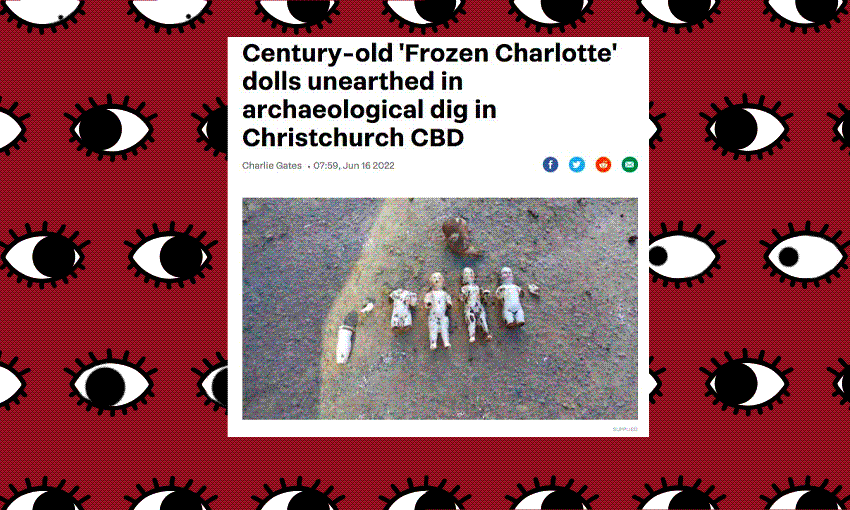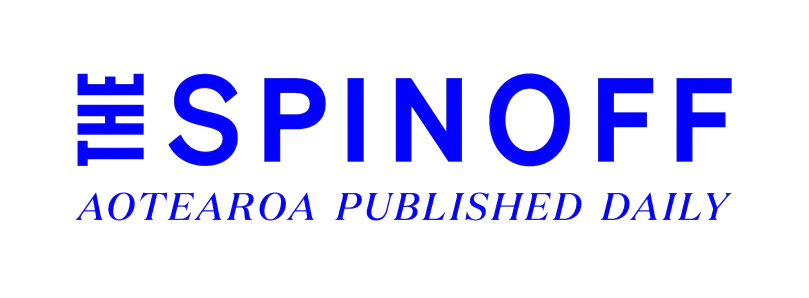Are we headed towards recession?
March quarter results showed a drop in GDP. Economists think that’s “Covid noise” but say recession is likely in late 2022 or early 2023.
Mōrena and welcome to The Bulletin for Friday, June 17, by Anna Rawhiti-Connell. Presented in partnership with Z Energy.
In today’s edition: new poll on Auckland mayoral race; appointment of new speaker could strengthen Te Pāti Māori, provincial growth fund gets pass mark; but first, the risk of recession.
US markets rallied briefly after Fed announcement but fell again overnight (Photo: RNZ)
GDP drops by 0.2%
Speaking to 1 News, finance minister Grant Robertson said the drop in GDP was a sign of the "very challenging times we've got around the world". The result wasn’t unexpected for some economists, although the Reserve Bank had forecast 0.7% growth for the quarter. In response, National's finance spokesperson Nicola Willis said "The Government needs to present a plan that gives people certainty that we will get out of the current, very difficult economic situation.” Stuff’s Tom Pullar-Strecker has a handy “take five” of the main things we need to know about the result. Firstly, most banks don’t think it will make much difference to home loan interest rates but that it may mean rates don’t rise as high as some previously thought. Robertson said it was "incredibly hard to predict" whether there was going to be a recession.
Data still “riddled with Covid noise”
ANZ senior economist Miles Workman said the GDP data is “still riddled with Covid-related noise". We last experienced negative growth in September 2021 when quarterly GDP dropped by 3.8%, reflecting the Delta lockdown. Our last technical recession, which is defined as two quarters of negative growth in GDP in a row, was in the wake of the arrival of Covid starting with the March 2020 quarter results. That was our first recession since the global financial crisis and worst since 1987. Economic activity has been volatile since then. BNZ’s head of research Stephen Toplis said "We reckon it will not be until we receive the news about the September quarter, which will be released in late December, that we will get a meaningful sense of how the economy is performing at the aggregate level."
Not there…yet
As always, the Herald’s Liam Dann (paywalled) has a clear and concise round-up from economists of why we’re not headed for recession…just yet. Speaking to RNZ’s Checkpoint last night, Toplis said he thinks a recession is likely in late 2022 or early 2023 although he hopes it will be short and sharp. ASB's Nathaniel Keall was wary about the longer-term economic outlook but warned against getting too pessimistic. "The economy isn't on the brink of caving in," he said. This morning’s Herald editorial (paywalled) warns of a long, cold winter ahead but says “with any luck it will be a short, sharp jolt rather than a dull, aching headache.”
Impact of US Federal Reserve's official interest rate rise
Writing for the subscribers in his Kaka newsletter yesterday morning, Bernard Hickey reflected on the US Federal Reserve's raising of the official interest rate. Hickey says: “My view is this very-fast monetary policy tightening is going to unleash a world of pain in financial markets and a hard stop to economic growth in the United States and Europe. Very quickly, unemployment is likely to start rising again and the inflation genie will disappear back into its bottle with a fright.” The US markets rallied briefly after the Fed’s announcement but fell again overnight.
A vital message from The Spinoff’s publisher, Duncan Greive
If you’re reading this, you’re hopefully getting value out of The Spinoff. Yet like many publishers, The Spinoff has suffered a significant drop in members, despite our costs continuing to increase. On one level I understand why our membership has dropped away. There’s a cost of living crisis, and inflation has made life hard for many of us. It’s totally normal to feel like you don’t need to support your local media organisation at a time like this.
The promise we’re making to you is that we’re actually better-suited to times like this than the pandemic itself. Our plan is to return to something more of what made us – coverage of culture, politics, te ao Māori and more with heart and humour. We will do that with features, essays and opinion pieces, but also podcasts, comics, video and newsletters. We are here to help walk you through this fascinating new era, and feel well-suited to being your guide.
But we can’t do it without you. The Spinoff has been cut out of the government’s enormous $100m plus Covid-19 campaign, which has been a boon to the big media companies and social media platforms. We returned the wage subsidy, unlike almost every other media organisation. The public interest journalism fund was narrowly targeted and is winding down. The big tech companies are refusing to do what they did in Australia and make meaningful deals with local media. And the recessionary drums continue to beat loudly, impacting the commercial spend we rely on, along with you, our members.
All of which is to say that we need your support more than we ever have. So please, if you can, click here to support The Spinoff by becoming a member today.
New Auckland mayoral poll
A new Auckland mayoral race poll has found there isn’t much between the top three candidates. The Ratepayers' Alliance-Curia mayoral poll has Labour councillor Efeso Collins and restaurateur Leo Molloy each on 21.7%, Heart of the City chief executive Viv Beck on 20.5% and businessman Wayne Brown on 20.1%. Auckland Ratepayers' Alliance spokesman Josh Van Veen said the poll shows Collins has the advantage thanks to the Labour Party machine and that "The time has come for National to get off the fence. In the interests of local democracy, we are calling on the Opposition to endorse a candidate for change in Auckland”. In other local body elections news, a New Plymouth district councillor’s billboard features his head photoshopped into an astronaut suit this year. The story could end there but the font size is causing problems and has prompted the council to send letters to 25 homeowners who also have non-compliant signs on their property.
Speaker appointment could create opportunity for Te Pāti Māori
1 News deputy political editor Maiki Sherman has picked up on a potentially notable consequence of Labour MP Adrian Rurawhe’s appointment as Speaker of the house. The new appointment could see him move to the list at the next election and not stand in the Te Tai Hauāuru seat. Rurawhe’s majority in the 2020 election was only 1000 votes. Te Pāti Māori co-leader Debbie Ngarewa-Packer ran against him and came second. Ngarewa-Packer came into the house in 2020 on the list after special votes were counted. Sherman thinks this might not be the only significant contest for the Māori seats with Peeni Henare making no secret of wanting to move to the list. Just 900 votes separated Te Pāti Māori's John Tamihere and Henare at the 2020 election in the Tāmaki Makaurau seat.
Chinese Languages in Aotearoa is a project by Te Papa to highlight the complexity of cultural identity within Chinese New Zealand communities. To learn more about the project read our interview with curator Grace Gassin. In partnership with Te Papa, featured above is a panel from a new short comic created for the project by Kwok Yi Lee (李国意).“I only learnt to speak Hokkien in my 20s to connect with my roots and communicate with my grandmother. There were next to no learning resources and I could only learn from my mother… it was not easy, but we gradually built up until I was able to start conversing with my grandmother in Malaysia. She has since passed on, but I will always have fond memories of her and our conversations” Hsen-Han Khoo (邱盛漢) To read the full story, click here. (Sponsored)
Provincial Growth Fund report shows it created jobs
The $3b Provincial Growth Fund was the work of NZ First and then-regional development minister Shane Jones. Labour promised to replace it with a smaller fund offering seed capital to get regional projects moving at the 2020 election. A new report has found it is creating job opportunities and increasing optimism outside the main centres. 8416 jobs had been created from the $1.87b paid out to 1359 approved projects. This is still short of the goal of establishing 10,971 jobs in the set timeframe. The scheme has drawn criticism, including from the auditor-general, and projects were scrapped when Covid arrived in favour of others that would generate faster results. In a press release, Act party leader David Seymour has called the numbers given in the report “nonsense”. The review also found evidence that it could have unintentionally reinforced existing inequities.
Inflation everywhere, except the housing market
It’s hitting food, petrol, rent, shipping and wages, but inflation hasn’t touched the housing market. Bernard is joined by Kiwibank economist Mary-Jo Vergara to unpack the surprisingly big and long spike of inflation that is cascading into every aspect of our day-to-day lives.
Got some feedback about The Bulletin, or anything in the news? Get in touch with me at thebulletin@thespinoff.co.nz
Christchurch archaeologists have dug up a bunch of 150-year-old “Frozen Charlotte” dolls. They are, to anyone's eyes, clearly haunted. Alex Casey asks the archaeologists to please put them back where they found them. Alex also has a story this morning about how frogs were once our living, croaking pregnancy tests. Duncan Greive has three charts that reveal just how much TV has drifted from our consciousness over the last two decades. Chris Schulz meets the owner of Silky Otter cinemas to hear how they've bucked all movie theatre trends to open new chains around the country. And in his final story from the Electric Highway, Don Rowe reflects on his journey around Aotearoa and finds plenty of reasons to be optimistic.
Work with us
We’re on the lookout for a senior news editor (nine month maternity cover) for The Spinoff and our sister studio Daylight also has a few cool jobs going — learn more here.
Aussies may go it alone on Super rugby competition
Rugby Australia’s chairman Hamish McLennan has told NZ Rugby’s chair Stewart Mitchell that Australia may walk away from Super Rugby Pacific in 2024. They are considering quitting the competition in favour of a domestic competition. Rugby Australia have been navigating tricky financial waters and this latest development is a result of discrepancies in broadcast rights income. NZ Rugby was paid A$91m by broadcast partners Sky, which exceeds the A$29m Rugby Australia receives each year. Rugby Australia wants more money, but NZ Rugby has previously refused to budge.
Marise Chamberlain’s one shot at Olympic glory
When New Zealand runner Marise Chamberlain got boxed in and stumbled near the start of the women’s 800m final at the 1964 Tokyo Olympics, she thought her medal hopes had disappeared. Then the crowd began chanting the colour of her singlet. Watch the latest episode of Scratched here.
It’s Friday so…
Our dogs recently tried to eat a solid chunk of our couch so this story comes as no surprise to me. As Stuff’s Brook Sabin reports, Kevin the Japanese Spitz caused pre-travel panic by eating one of his owner’s passports. The absolute heroes at the Christchurch passport office came to the rescue but also confirmed this wasn’t the first time a dog had eaten one.











